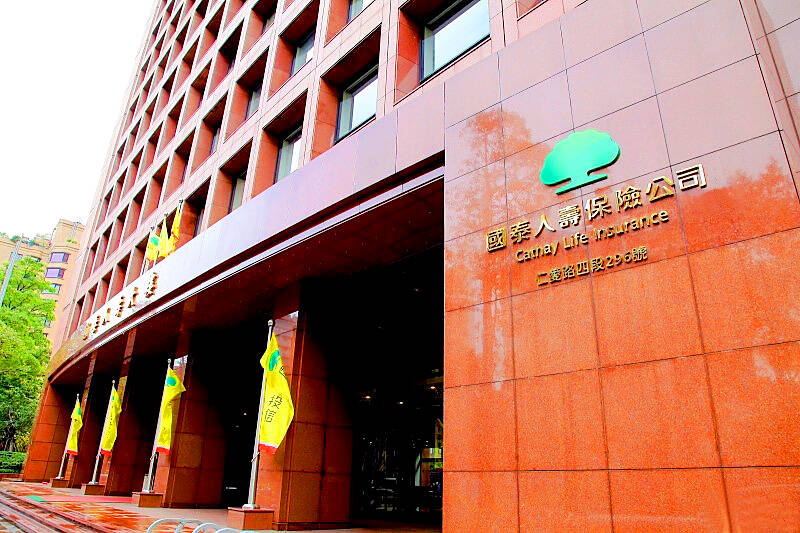Cathay Life Insurance Co (國泰人壽) yesterday said its after-hedging recurring yield is expected to hit a record high this year, in light of higher foreign bond yields and lower foreign-exchange hedging costs.
The profit engine of Cathay Financial Holding Co (國泰金控) saw its pre-hedging recurring yield reach 3.16 percent in the first half of this year, up from 2.84 percent a year earlier, due to rising yields for new foreign bonds amid rate hikes, it told an online investors’ conference.
Cathay Life said its cash dividend income would likely grow 10 to 15 percent this year from NT$20 billion (US$658 million) last year, as its equity investments have generated more dividends this year, in contrast to its focus last year on realizing capital gains by selling stocks, Cathay Life executive vice president Lin Chao-ting (林昭廷) told the conference.

Photo: Allen Wu, Taipei Times
Like bond yields, cash dividend income is a source of recurring yield for life insurers.
The life insurer said it registered a hedging gain of 0.21 percent for the first half of this year, translating into a gain of US$0.21 for every US$1 invested in assets denominated in foreign currencies.
The hedging gain was due to the insurer’s well-performing hedging strategy that helped offset hedging costs incurred in the use of more traditional hedging tools, such as currency swaps and non-deliverable forward, Lin said.
Cathay Life continued to see hedging gains last month, but whether it can maintain the gains during the second half would depend on market conditions, he said.
“Overall, considering our good pre-hedging recurring yield and the possibility of making hedging gains, we expect our after-hedging recurring yield to hit a record high this year,” Lin said.
From January to June, the life insurer made a net profit of NT$40.5 billion, the second-highest for the period, even though it was down 48 percent year-on-year due to a high comparison base last year.
Asked if the implementation of the International Financial Reporting Standards 17 (IFRS 17) would affect its financial strength, Cathay Life said its book value would expand under the new rules, citing internal calculations.
Under the IFRS 17, a life insurer’s assets and debts would be affected by changing interest rates, and Cathay Life found that rising interest rates would actually lead to a rise in its net worth, Lin said.
However, it is uncertain whether rate cuts would affect the book value contrarily, Lin said, adding that the company needs to do more calculations.

GROWING OWINGS: While Luxembourg and China swapped the top three spots, the US continued to be the largest exposure for Taiwan for the 41st consecutive quarter The US remained the largest debtor nation to Taiwan’s banking sector for the 41st consecutive quarter at the end of September, after local banks’ exposure to the US market rose more than 2 percent from three months earlier, the central bank said. Exposure to the US increased to US$198.896 billion, up US$4.026 billion, or 2.07 percent, from US$194.87 billion in the previous quarter, data released by the central bank showed on Friday. Of the increase, about US$1.4 billion came from banks’ investments in securitized products and interbank loans in the US, while another US$2.6 billion stemmed from trust assets, including mutual funds,

Micron Memory Taiwan Co (台灣美光), a subsidiary of US memorychip maker Micron Technology Inc, has been granted a NT$4.7 billion (US$149.5 million) subsidy under the Ministry of Economic Affairs A+ Corporate Innovation and R&D Enhancement program, the ministry said yesterday. The US memorychip maker’s program aims to back the development of high-performance and high-bandwidth memory chips with a total budget of NT$11.75 billion, the ministry said. Aside from the government funding, Micron is to inject the remaining investment of NT$7.06 billion as the company applied to participate the government’s Global Innovation Partnership Program to deepen technology cooperation, a ministry official told the

Taiwan Semiconductor Manufacturing Co (TSMC, 台積電), the world’s leading advanced chipmaker, officially began volume production of its 2-nanometer chips in the fourth quarter of this year, according to a recent update on the company’s Web site. The low-key announcement confirms that TSMC, the go-to chipmaker for artificial intelligence (AI) hardware providers Nvidia Corp and iPhone maker Apple Inc, met its original roadmap for the next-generation technology. Production is currently centered at Fab 22 in Kaohsiung, utilizing the company’s first-generation nanosheet transistor technology. The new architecture achieves “full-node strides in performance and power consumption,” TSMC said. The company described the 2nm process as

JOINT EFFORTS: MediaTek would partner with Denso to develop custom chips to support the car-part specialist company’s driver-assist systems in an expanding market MediaTek Inc (聯發科), the world’s largest mobile phone chip designer, yesterday said it is working closely with Japan’s Denso Corp to build a custom automotive system-on-chip (SoC) solution tailored for advanced driver-assistance systems and cockpit systems, adding another customer to its new application-specific IC (ASIC) business. This effort merges Denso’s automotive-grade safety expertise and deep vehicle integration with MediaTek’s technologies cultivated through the development of Media- Tek’s Dimensity AX, leveraging efficient, high-performance SoCs and artificial intelligence (AI) capabilities to offer a scalable, production-ready platform for next-generation driver assistance, the company said in a statement yesterday. “Through this collaboration, we are bringing two